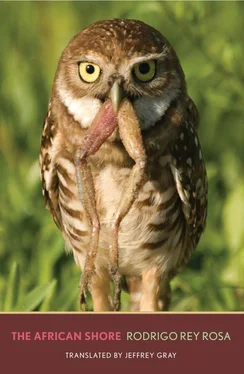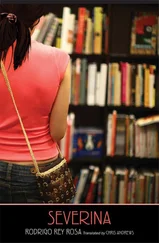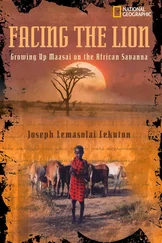He came out of the tool shed and, making a wide circle, headed back toward the guest house. He carried a bundle of cord to tie up the owl with, and a two-handled basket full of firewood. The muezzin at the new mosque called out the evening prayer. Down among the many-colored trunks of the eucalypti, Hamsa saw his grandfather prostrate on his straw mat, concentrated in prayer. He headed down the flagstone path, glancing back once toward the main house, where there was no one in sight. But he couldn’t be sure: the windows of Mme. Choiseul’s room looked out on that part of the garden, and in the afternoon light they were large mirrors, reflecting the sky and the tops of the cypresses. The old Christian woman might be there. Hamsa hesitated a moment; then, saying “Bismil-láh,” he pushed open the door of the guest house and closed it quickly behind him.
The owl turned its head to look at Hamsa. It raised its good wing and opened its beak.
Hamsa advanced with the bundle of cord in one hand and the basket of kindling in the other. He lowered the basket to the floor, took out the kindling, and put it in a wicker container next to the fireplace. He approached the owl and saw its broken wing. He seized it by the neck, tied its feet — the owl did not resist — and put it in the two-handled basket. He looked around, approached the window, and opened it all the way. A cold wind entered the room.
Old Larbi, smoking kif under the fig tree, scarcely opened his eyes when Hamsa appeared from behind the hut with the owl hidden in a bundle of clothes.
“Salaam aleikum.”
“Aleikum salaam.”
Larbi stood up, went into the hut for his things, and prepared to leave. He was a bad-humored old man. Hamsa thought Larbi doubted he was sick.
“The animals didn’t give you any problem?”
“No.”
“Where’s Ismail?”
“I haven’t seen him. He hasn’t come by.”
“If you see him, please tell him to come. I’m going to need his help.”
The old man smiled mockingly. “Ouakha,” he said. He turned and started up the road.
Hamsa went into the hut and took the owl out of the bundle of clothes. He drove a Y-shaped stake in the earth in one corner. He tied the cord to the stake to secure the owl. The owl hopped onto the Y and opened its beak.
Hamsa lay down on the sheepskins and filled a pipe with kif, waiting for Ismail to come.
“I’m cured now,” he said when Ismail came in.
The little boy looked at the owl, perched on the Y, eyes closed, wing fallen.
“I’m going to kill it one of these days and eat one of its eyes,” explained Hamsa. “With the other eye, I’ll make an amulet.”
Ismail seemed impressed.
“Poor thing.”
“Come here,” said Hamsa, making a downward gesture with his hand.
When the little boy stepped within reach, Hamsa grabbed one of his arms and pulled him toward him. With his free hand he lifted up his gandura.
A sharp pain at the top of his head made him open his eyes. He rolled over in the sheets, remembering he was in a hotel called Atlas but unable to remember where he’d spent the last hours of the night before.
Those recent memories were lost forever in a hole of black light, but he knew that, once again, he had had too much to drink. Shaking his head no, he sat up on the edge of the bed. He picked up the phone to call his traveling mates, Victor and Ulysses, but they didn’t answer. The receptionist told him they hadn’t come back yet.
He stood up, walked to the window, and drew back the blood-colored curtains. He immediately regretted it. The clear African noon struck his eyes as if two fingers had jabbed through them all the way to the back of his head. He walked back to the bed and fell onto it, burying his head between the pillows.
Suddenly, he remembered — a memory in red and black, in miniature: two girls. They were laughing in shadows of muddy light, smoking cigarettes and drinking beer. Ulysses and Victor were there too. There were more girls, many girls, and a shining ball hung from the ceiling shooting out bright needles in all directions. Now he remembered sounds: a raucous music of Moroccan violins and drums, whose purpose seemed to be to drown out the shrieks and arguments of the women.
“Nadia.”
“Aisha.”
Kisses on both cheeks. Repeated orders of drinks and cigarettes. A misunderstanding? One girl had pointed to the other with her finger and shouted:
“Syphilis!”
A fight.
Another place, very similar to the first.
A trip in two taxis — he and his two friends and three women were driven to a hotel on the outskirts. At the front desk, a receptionist with the look of a cop demanded money and passports.
“The passport!” he moaned between his teeth. He rolled out of bed and went to get his jacket and pants from the back of a chair — they stank of smoke. He rummaged among the disordered clothes of his suitcase, all the while remembering, with equal parts regret and frustration, the scene from last night: Ulysses and Victor walking toward the elevator with their girls; his own girl, irritated, watching him search uselessly through his pockets; the receptionist fixing him with a look of Muslim disdain.
It was Friday. From a nearby mosque, a muezzin called the mid-day prayer. While good Muslims bowed on their rugs to pray, he took a shower long enough to use up the hot water supply of the hotel. Then, wrapped in a large white towel, he fell back on the bed. He lifted up the phone and asked the operator the number of the Colombian consulate. He dialed it, but no one answered.
He got dressed and went down to the reception desk. He wrote down the particulars of the consulate and asked the receptionist how to get there.
“That’s in the Casbah,” he said. “But today’s Friday and it’s late.” He looked at his watch. “I don’t think they’ll see you.”
“I need to send a fax.”
“You can do that here, but it’s expensive. Better to do it from a teleboutique. There are plenty of them nearby.”
He left the hotel, thinking the receptionist’s good advice was due more to laziness than honesty. Musa Ben Nusair Street was deserted. Fridays in Morocco were special days. People crowded into the mosques to listen to the sermons of the imams; he’d been told their attacks on the government and the Sultan’s family were increasingly explicit. And meanwhile his friends were probably fornicating. What mixture of pleasure and disgust would they experience, he wondered. Turning down a street formerly called Velázquez but that now had an Arab name, he walked toward the Faro internet café, which he knew from an earlier visit. He started to compose in his mind the message he would send home; he felt irritated that he’d have to lie but relieved that now he had a valid excuse for putting off his return.
Victor and Ulysses looked like new, freshly bathed, as they sat drinking whiskey in their room.
“So what happened, che boludo ?” Ulysses said, putting on an Argentine accent. “Did you find the passport?”
“No,” he said, collapsing on the sofa. Victor handed him a glass of whiskey.
“Well, then?” asked Ulysses.
“I’m staying,” he said with a smile. “How did it go last night?”
Victor shrugged and lifted his hands. “So-so.”
“For me,” said Ulysses, “phenomenal!”
“Whoremonger,” Victor sneered.
“What can I say? The thing is to get off. Anyway, they’re not really whores — not like ours, I mean. There’s a big difference.”
Читать дальше












